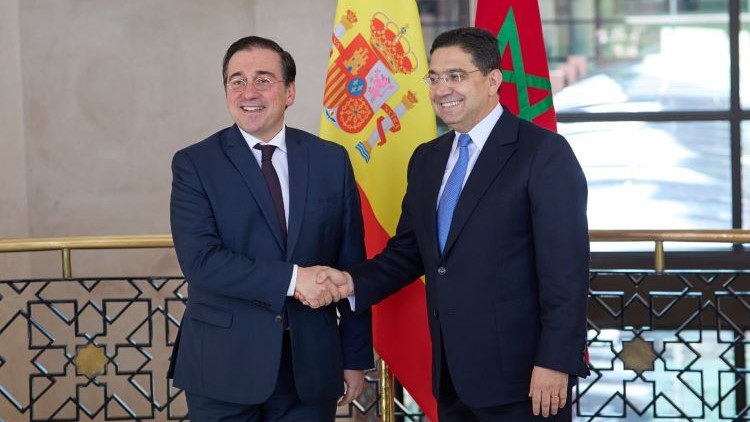Eduardo González
The Minister of Foreign Affairs, José Manuel Albares, conveyed yesterday to the Government of Morocco that, on the part of Spain, “everything is ready for them to start operating” the land customs with Ceuta and Melilla and, therefore, “no more pilot tests are necessary”. However, he did not get any date for the opening of customs during his meeting with his Moroccan counterpart, Nasser Bourita, who attributed the delays to “technical problems”.
Albares began his official visit to Rabat yesterday with a meeting with Moroccan Prime Minister Aziz Akhannouch. During the meeting, which lasted half an hour and was not on the minister’s agenda, the two sides praised “the privileged relations of friendship and cooperation” and the “bilateral strategic partnership” between the two countries, “based on good neighborliness, mutual trust and permanent and constructive dialogue”, and “welcomed the concordance of views on the different matters of common interest”, as reported by the Moroccan government in a statement.
In addition, according to diplomatic sources, Albares and the Prime Minister discussed migration and economic issues and the organization of the 2030 World Cup by Spain, Morocco and Portugal.
After the meeting with the Prime Minister, Albares resumed the agenda initially planned and, according to the usual protocol of official visits to Morocco, made a wreath at the tombs of Kings Mohammed V and Hassan II, accompanied by the Spanish ambassador in Rabat, Ricardo Díez-Hochleitner, and the Moroccan ambassador to Spain, Karima Benyaich.
Bourita speaks of “technical problems” and Albares says that “no further test is needed”
Subsequently, the Minister of Foreign Affairs was received by his Moroccan counterpart, Nasser Bourita, with whom he addressed, among other issues, the delimitation of territorial waters and the opening of land customs with Ceuta and Melilla, two of the points included in the Road Map adopted in April 2022 in Rabat by the President of the Government, Pedro Sánchez, and King Mohammed VI. Melilla customs is closed in 2018 and Ceuta has never had a customs office.
At the joint press conference between the two ministers, Albares expressed his desire to “open new and more fruitful stages” with Morocco and assured that “the bilateral relationship was never as intense and fruitful as it is now, both for Spain and Morocco.” In the same sense, Bourita affirmed that “bilateral relations are at their best moment” and declared that Spain is “a trustworthy ally” and an “exemplary neighbor”.
Likewise, Bourita assured that, as far as Morocco is concerned, there will be a “reopening of customs in which a common formula will be applied that will result in improvements and will not generate any kind of frustration”.
According to the Moroccan minister, the working group on customs (of the total of seven working groups set up to deal with the various bilateral issues envisaged in the Road Map, such as economy, trade, culture, cooperation, immigration, fishing or international waters) is the one that has met most often and, therefore, “considerable progress has been made on this issue” thanks to the three pilot tests carried out in January, February and May, which have made it possible to detect “which are the aspects that need to be developed further”.
Nasser Bourita did not want to give a specific date for the opening of customs and assured that “it is not a problem of commitment or politics, it is a problem of technical implementation”, for which he expressed his confidence that this “common objective” could be reached in “the coming months”. In any case, he insisted, all the commitments included in the Joint Declaration “will be executed and fulfilled”.
For his part, Albares assured that both Bourita and the Prime Minister had told them that, as far as Spain is concerned, “everything is ready for customs to start operating” and, therefore, “no further pilot tests are necessary”. He also expressed his confidence that, once the election period and the formation of a government in Spain are over, everything agreed can be relaunched.
With respect to the delimitation of territorial waters with Western Sahara (another point of the Road Map of particular concern to the Canary Islands), Albares and Bourita assured that the working teams will continue to meet and the Spanish minister pledged that the Canary Islands will be represented at these meetings. “There cannot be any unilateral measure or any kind of surprise action”, everything must be solved “through dialogue and cooperation”, warned the Moroccan minister.
Nasser Bourita also assured journalists that Spain’s position on the issue of Western Sahara “has not changed” and remains “the one already expressed” in the Joint Declaration of April 7, 2022 and in the Declaration of the twelfth High Level Meeting (RHN) Morocco-Spain, held in February 2023.
The Joint Declaration of April 2022, agreed by King Mohamed VI and Prime Minister Pedro Sanchez, states that “Spain considers the Moroccan autonomy initiative, presented in 2007, as the most serious, realistic and credible basis for the resolution of this dispute”.
The Polisario asks Sánchez for “courage”
Precisely, Abdulah Arabi, representative of the Polisario Front in Spain, issued yesterday a press statement on the occasion of the trip of Albares to Morocco in which he warned that, after “almost two years” since “Pedro Sánchez took a position in favor of the claims defended by Morocco in relation to Western Sahara”, it has been “proven that the bet of Morocco on the autonomy of Western Sahara has not been accepted”, it has been “confirmed that the commitment to subordinate the legitimate rights of the Saharawi people to self-determination and independence to the insatiable demands of Morocco has not brought any benefit for Spain”.
“Mr. Sánchez still has the power to reverse the situation,” he continued. “It is an opportune moment for Spain to assume the central role that corresponds to it as the administering power of the Non-Self-Governing Territory of Western Sahara”, to “courageously assume the legal responsibilities imposed by international law” and to stop “subordinating bilateral relations with Morocco to the violation of the rights of the Saharawi people and allow them, through the exercise of the right to self-determination, to freely decide their future”, he concluded.







